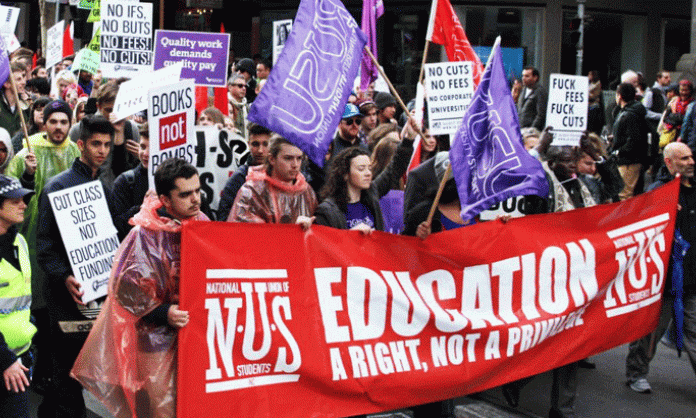As soon as the Coalition took office, it began thinking of ways to further its neoliberal agenda for education. So far it has suggested the following: privatise student debt, reintroduce caps on university places and abolish student union funding.
The December National Union of Students (NUS) conference is an opportunity to debate and discuss how the student movement can resist this agenda.
As is the case every year, there will be a sharp divide between those who want to produce postcards and surveys and those who want to organise protests and build active, grassroots campaigns.
Following the many ominous statements of intent coming from Liberal ministers, and the largest campaign against funding cuts in a decade, it is clearer than ever this year that postcards and surveys need to be shelved.
A neoliberal education system
Students in Australia are charged some of the highest tuition fees in the OECD, have enormous debt burdens and struggle day to day with the cost of living. An estimated two-thirds of students live below the poverty line.
Meanwhile, Australian universities are more profitable than ever. Tertiary education is consistently one of the country’s largest export industries.
This year the Labor government made the biggest cut to university funding in 17 years. It also abolished Centrelink start-up scholarships and replaced them with loans.
The Liberals have happily continued where Labor left off. Christopher Pyne has already introduced a bill that proposes slashing $900 million from Commonwealth grants over the next four years. This is just the beginning.
Abbott and Pyne were both blooded as crusaders against public education during their time as ministers in the Howard government. Now they want to continue.
Privatising HECS, which Pyne is “keeping an open mind about”, would be a drastic measure that would lead to fee increases and interest rate hikes on student debt.
Pyne has also set up an inquiry into caps on places and into “demand driven” education (i.e. corporatisation of universities). The inquiry is headed by David Marr and Andrew Norton, both known advocates for the marketisation of education. While we can’t predict the exact outcome, the agenda is obvious.
To top off these attacks, the Liberals are now seriously considering abolishing the student services and amenities fee. SSAF is inadequate in many ways, but removing one of the last remaining lifelines for student organisations is a calculated attempt to destroy them.
A fighting national union
In order to confront these attacks, we need a union that is willing and ready to fight. Students have already shown their willingness to act this year.
Grassroots activism built the protest-based campaign against the federal funding cuts, which included the biggest student demonstrations in almost a decade. This bottom-up campaign work would have been significantly weaker if not for NUS. NUS called two major demonstrations that were attended by thousands of students. It provided resources and the political authority that gave the campaign greater reach. There is no other institution that can fulfil such a role or claim to represent such a large number of students.
The fact that NUS is capable of leading a serious campaign against the Abbott government does not necessarily mean that it will. NUS has a chequered history; it has more often than not shied away from the actions required to defend and improve our education.
NUS was formed in 1987 as a conservative alternative to its predecessor, the Australian Union of Students (AUS). In 1973 AUS had declared itself for “the building of a socialist Australia”, whereas NUS’s founding mandate was to lobby for “a better deal from Canberra”. This reflected the fact that NUS was largely initiated by right wing Labor Party bureaucrats, who have had a large stake in NUS ever since.
Nevertheless, when NUS has taken a stand, it has proved that fighting student unionism can be effective. In 1995 Labor Prime Minister Paul Keating tried to increase HECS levels. In response, NUS called a series of national protests that involved more than 25,000 students. Following these demonstrations, which were militant, disruptive and extremely popular with students and staff, the government backed down.
After coming under assault from the Howard Liberal government, and then capitulating to recent Labor governments, the Labor left within NUS has gradually abandoned protest politics. The Labor right faction has grown in influence, taking more and more positions in the union.
The anti-cuts campaign this year was a welcome departure from this trend. But it needs to go further. NUS needs to rebuild itself as an activist and combative body. We need to give a lead to students and signal our intention to fight the Abbott government.
The national conference
Socialist Alternative is proposing that the main NUS campaign for 2014 be “Abbott and Pyne: get your hands off our education”. This campaign should involve central street demonstrations in every major city and should be organised at the grassroots on campuses and through activist collectives.
Socialist Alternative students are submitting policies to the NUS conference that detail how the campaign should proceed. We are also arguing that a candidate from Socialist Alternative be elected to the position of national education officer, in order to enact these policies and begin to rebuild the student movement.
We believe that meaningful debate and discussion around policy, and particularly education policy, should be the priority for the conference. Too often the election of candidates and voting on campaigns takes place in a bureaucratic manner, without discussion and debate over strategies and tactics.
We also argue that discussions at conference should not be limited to adopting policy, but should also collectively plan the contours of our campaign. Socialist Alternative will be initiating campaign workshops outside of the official conference sessions to facilitate this.
Lastly, we propose that all conference participants rally at 1pm on the Tuesday of the conference. La Trobe University is implementing the biggest single cut to a university budget in Australian history. We need to show solidarity with the La Trobe students and use this rally to launch the wider campaign against the government.









